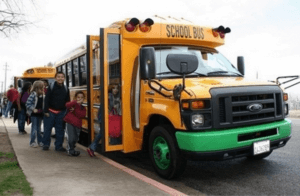First Priority GreenFleet, a clean transportation solutions provider and division of First Priority Global Ltd., is partnering with the Sacramento Metropolitan Air Quality Management District (SMAQMD) to deploy 29 electric school buses and charging infrastructure throughout Sacramento County, including Twin Rivers, Elk Grove and Sacramento City Unified School Districts.
Funded in part by a grant from the California Air Resources Board (CARB) through California Climate Investments, the project will provide the largest-ever U.S. deployment of zero-emission school buses to reduce greenhouse-gas emissions, eliminate mobile criteria pollutants, and provide sustainable transportation for school children in California’s capitol.
According to First Priority GreenFleet, school buses are the largest segment of mass transit in the U.S., carrying twice as many passengers as the entire U.S. transit bus and rail segments combined. Existing diesel school bus fleets disproportionately expose school children to toxic air contaminants and associated health risks. Consequently, this large-scale deployment will eliminate mobile criteria pollutants and provide health co-benefits to both school children and the greater community.
Larry Greene, executive director for SMAQMD, says, “The Sacramento Metropolitan Air Quality Management District is thrilled to be able to be a partner in a program that will bring these zero-emission school buses to Sacramento, where they will provide safe and efficient transportation to our schools and cleaner air for the students and the communities they serve.”
In partnership with CARB and SMAQMD, First Priority GreenFleet will deploy the 100% battery-electric, zero-emission eLion Type C school buses and the Trans Tech all-electric eSeries, built on the Ford E450 chassis with an all-electric powertrain developed by Motiv Power Systems, as well as oversee the implementation of the charging infrastructure with EV Connect and the deployment of the Data Management System to optimize charging.

As reported, the project’s goals are to demonstrate that commercially available zero-emission school buses have the lowest cost of ownership, substantially reduce maintenance costs, improve operational performance, and are optimally suited to serve the needs of school districts and sustainably transport California’s kids to and from school.
Peter Christensen, manager of Innovative Heavy Duty Strategies at CARB, comments, “This project is a great example of how the cap-and-trade program is fighting climate change while improving local air quality and delivering benefits to disadvantaged communities.”
In addition, Timothy Shannon, director of transportation for the Twin Rivers Unified School District; Jill Gayaldo, director of transportation services for the Elk Grove Unified School District; and Ronald Hill, director of transportation services for the Sacramento Unified School District all expressed their excitement to participate in the program and to expand awareness of zero-emission technologies.





